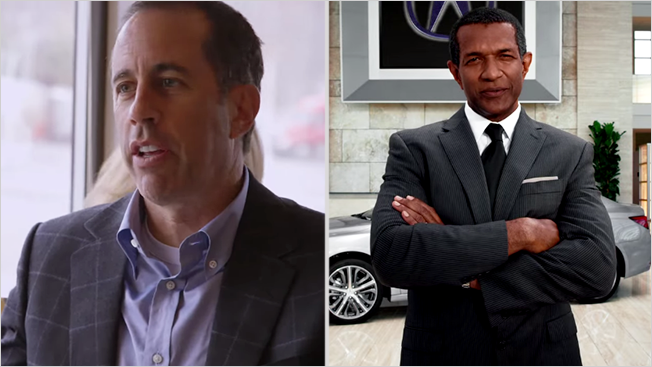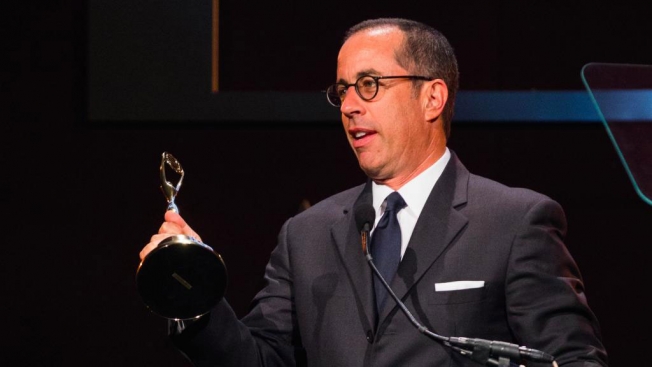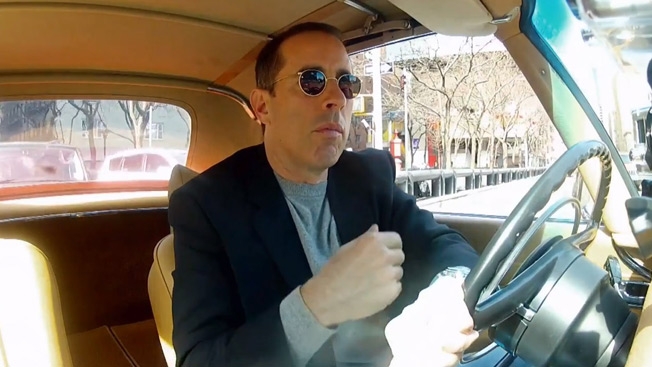
Jerry Seinfeld’s last set of Acura ads took the automaker to some truly odd places, like an emergency room plagued by putrid potato salad and a 1960s-era rocket launchpad. Now he’s taking the brand somewhere quite a bit different: a car dealership.
Seinfeld has once again written the Acura ads that will bookened his hit video series, Comedians in Cars Getting Coffee, on Crackle. Last time around, he told AdFreak he was trying to channel his inner drunken ’60s copywriter with breathless retro enthusiasm for even the most minor amenities.
The new ads move back into the modern era and dial back the weirdness. Instead, we get a fast-talking, confident car salesman who dispenses a constant string of seemingly unrelated words of wisdom while showing off the new TLX.
We caught up with Seinfeld and Acura svp and general manager Michael Accavitti to get the story behind the new campaign and learn why this is the kind of guy Jerry wants selling him a car.
AdFreak: So these ads are obviously a bit of a departure from the last campaign. Who is this guy? Is he a car salesman? Life coach? Stand-up comedian?
Jerry Seinfeld: He’s a car salesman life coach. He’s the guy who is the antidote to the usual car commercial, which is all about what this is going to do for your lifestyle, how this car is going to change your social standing, and I thought it worked for Acura and for my personal perspective.
To me, what you want when you buy a car is a great car, and it’s not about what the neighbors think, or how you’ll look at yourself because you have it. So, that was kind of the idea of making this guy a guy who says, “Let me tell you what’s really important. Don’t block the sidewalk with your extendo dog leash.”
Is he a likable guy? I mean, he drives this kind of hard sale, and he’s not even a dog person.
Seinfeld: To me, he is. If you like no BS, he’s likable.
The line, “I sell cars, you sell you”—did that exist before the character?
Seinfeld: The whole thing kind of came together with that line. We thought, that’s the kind of guy I would like to sell me a car.
Really the only other recurring line through the ads is this phrase: “Tight, quick, comes in seven colors.” That’s not your usual luxury-car tagline.
Seinfeld: Well, this car’s a little sportier. We’re not really going for a luxury thing, I would say, as much as responsiveness.
Michael Accavitti: Performance is one of the areas that we feel the TLX really delivers on. You know, it’s a luxury sports car in its own right, but the performance message is the one we want consumers to take away, and that was why we focused on that.
So, why focus so much on the colors, too? “Comes in seven colors” just seemed to me like a funny thing to call out each time.
Seinfeld: (Laughing) Yeah. I don’t know. It’s just, like, let’s get to the colors. I mean, that’s the biggest thing to me with a car is, what color do I want? If the car’s great, then the color’s the only difficult decision. We’re saying, you don’t have to worry about the car; the car is great. Just figure out what color you like.
After the fun, retro storytelling in the last campaign, I was a little surprised to see you move these ads into the dealership. Did you worry you’d be limiting yourself by moving it into this very traditional space?
Seinfeld: No. This one was really more about this character, about this salesman who kind of explains to you that you need to worry about your life, we’ll take care of the car.
Did either of you have any concerns that, other than being tied to your show, these ads wouldn’t be quite Jerry Seinfeld enough? Last time, even the voiceover sounded like you.
Seinfeld: I’ve never gotten that question before. It’s a very flattering question. I actually put in a piece of my standup from the ’80s in one of the commercials, which has nothing to do with anything except that we just thought it was funny.
The line about how Alans need to settle on a way to spell their names?
Seinfeld: No, it was the thing about the post office. The wanted posters in the post office: Why don’t they hold on to this guy when they’re taking his picture? So, it’s definitely me. I was really surprised last time that people thought it was me doing voiceover, but I did hear that from a few people. But that was never intended.
Is this something that you see being an annual part of bringing the show back each season—crafting the ads? Are you excited about doing that each year?
Seinfeld: I love advertising, and especially when you have a client like this, who’s bold and creative and wants you to be the same way. That’s a really fun thing for me; otherwise I can’t do it. I wouldn’t be able to do it.
But the whole thing kind of works because it’s the Internet, and it’s a comedy show, and if you can get the viewer and the consumer to see all of this as entertaining, that’s a really fun puzzle to solve. I like a Rubik’s Cube like that. Can I make the commercials as much fun as the show and make them kind of feel like part of the show? That’s a cool, new puzzle.
Accavitti: We’re hoping the viewers will look forward to the new commercials as they do the show.
What reaction have you gotten from other comedians or celebrities? Do they want to be more hands-on with the advertising around their Internet shows, too?
Seinfeld: It’s frankly a completely different skill set, even though it’s still being funny. I mean, I did commercials for American Express in the ’90s when I was doing the TV series. Those two things were unrelated, but I learned a lot about making commercials, and that was really good training. I think the average celebrity, and Mike could probably speak to this, really just wants to know, “How much are you going to pay me, and when can I leave?” And my attitude was always the opposite, which was, “Let me do this whole thing, because I like to do it.”
Accavitti: This is the attraction of the partnership with Jerry. When we did the Super Bowl ad a couple of years ago, he demonstrated that he really wanted to be a partner and really be a part of it, and we thought, Hey, this is fantastic, right? You have one of the greatest minds in comedy that wants to help you make your advertisement, or your message, even more appealing or funnier. And so, it’s just something that we’ve really enjoyed, and something we want to continue to do.
Jerry, do you feel like some of the stigma around celebrities in advertising is starting to go away? It used to be everyone had to go to Japan to be in any kind of ad.
Seinfeld: No, I don’t think that goes away. That stigma remains if the ad stinks. If it looks like the guy or woman showed up for a payday, I think it’s a bad ad, and it’s bad for the celebrity in the ad. It doesn’t work for anybody. But if the ad’s good, it works. It’s always about the ad, to me.
If you were talking to a young comedian or performer coming up, and they were asking you about getting involved in advertising, what kind of advice would you give them?
Seinfeld: I would say if you’re not interested in really being part of the process, it’s a big gamble, image-wise, for a performer. It could be quite a turn-off. You can like somebody, and you see them in a really lame ad, and all of a sudden, you don’t like them so much.
Are there any campaigns or ads out right now that you think are also doing it right?
Seinfeld: No, I don’t think so. Only us.













